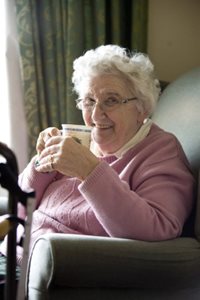Nutrition & Hydration in Older People
Published: 16/03/2017
Nutrition and hydration is of core importance to everybody’s health and well-being. As we continue to age, good nutrition and keeping hydrated is not always easy to maintain.
Nutrition and hydration is of core importance to everybody’s health and well-being. As we continue to age, good nutrition and keeping hydrated is not always easy to maintain.It is suggested that:
- Malnutrition affects 10% of the elderly population
- 93% of people at risk of malnutrition live in the community
- 25% of elderly people have mild chronic dehydration
Myth - Only people who are under-weight can be malnourished
Fact – Anyone can develop malnutrition if their body does not receive the correct balance of nutrients over a period of time.
Malnutrition sounds very serious, and sometimes it can be, but as people get older and frailer there is a higher incidence of people not receiving the nutrients they require for many. The factors that can lead to malnutrition and methods to enhance a person’s nutritional intake are discussed below.
 How can malnutrition occur?
How can malnutrition occur?
Different factors can contribute to a person not getting sufficient nutrients; it is not always as simple or straight-forward as an unbalanced diet.
It is not always easy to attribute symptoms to illnesses, especially if the person you care for has a number of health conditions. It is true to say that you will know the person you care for and you will know if their behaviours or symptoms are typical for them or their condition. The list below highlights symptoms associated with malnutrition, but remember, don’t make a diagnosis yourself consult your Doctor if you are concerned.
If you want to ensure that the person you care for continues to get enough nourishment, or you may have concerns as to whether they are eating properly, these hints and tips could be useful
If the person you care for is malnourished, simple steps can improve their condition and hopefully see them back to good health quite quickly. Depending on the level of malnutrition, different methods of treatment may be advised, and recovery time may also vary.
It is believed that 25% of elderly people experience mild chronic dehydration. The recommended daily intake of water per day to maintain optimum hydration is 8 to 10 glasses.
Older people are more likely to become dehydrated because:
We are familiar with most of the symptoms of dehydration such as, thirst; tiredness; dizziness; dry mouth/lips/skin; and, dark coloured or strong smelling urine which can be accompanied with infrequent urination. These symptoms of dehydration can happen to any of us and can be easily rectified by increasing fluid intake but, if dehydration is left untreated, more serious symptoms can occur such as: confusion; low blood pressure; weak pulse; rapid heartbeat; and, low level of consciousness
Although dehydration itself can make someone feel unwell, other health conditions are known to be linked to poor hydration which is why keeping hydrated is highly recommended to us all but especially as we get older. By keeping well hydrated you could decrease the risk of developing some of these conditions, or if you experience any of these conditions keeping hydrated could improve your symptoms. Encouraging hydration
Encouraging hydration
It is not always an easy task to encourage someone to drink, especially if they do not experience the sensation of thirst or they have underlying fears of getting to the bathroom. These tips may help
Fact – Anyone can develop malnutrition if their body does not receive the correct balance of nutrients over a period of time.
Malnutrition sounds very serious, and sometimes it can be, but as people get older and frailer there is a higher incidence of people not receiving the nutrients they require for many. The factors that can lead to malnutrition and methods to enhance a person’s nutritional intake are discussed below.
Different factors can contribute to a person not getting sufficient nutrients; it is not always as simple or straight-forward as an unbalanced diet.
- As people get older, their sensitivity to taste decreases which can take pleasure away from eating
- Difficulty eating and swallowing, e.g. ill-fitting dentures, or a condition which makes swallowing uncomfortable, or they may fear choking
- Unable to absorb nutrients, e.g. prescribed medication can prevent the absorption of certain nutrients; or nausea, vomiting, diarrhoea, constipation
- A person’s desire to eat can be affected by depression, loneliness, or isolation
- Health conditions can make it difficult or painful to prepare or cook food
- Is their eating environment comfortable for them? Are they seated and supported comfortably? Do they prefer to eat at the table or is it more comfortable to eat of a lap tray?
- Health conditions can affect eating habits? E.g. Dementia – do they remember to eat? Parkinson’s – do tremors affect their ability to feed themselves or prepare food?
It is not always easy to attribute symptoms to illnesses, especially if the person you care for has a number of health conditions. It is true to say that you will know the person you care for and you will know if their behaviours or symptoms are typical for them or their condition. The list below highlights symptoms associated with malnutrition, but remember, don’t make a diagnosis yourself consult your Doctor if you are concerned.
- Weight loss
- Tiredness/fatigue
- Muscle wastage & weakness
- Dry skin and/or brittle nails
- Irritability/ low mood
- Increased susceptibility to illness or delayed recovery from illness
- Dizziness
- Skin rashes
- Swollen tongue/ sore mouth
If you want to ensure that the person you care for continues to get enough nourishment, or you may have concerns as to whether they are eating properly, these hints and tips could be useful
- Encourage small but frequent meals (every 2-3 hours)
- Find out which foods they enjoy eating
- Avoid over repetition of the same meals/foods - variety can be exciting!
- Serve suitable portion sizes – it can be off putting if a plate is too full, serve a moderate amount and they can always ask for more
- Ensure that the texture and consistency of the food is how they like it, and take into consideration the person’s ability to chew and swallow the meals that are served
- Encourage milky drinks and snacks between meals (aim to drink 1 pint of full cream milk per day)
- Provide assistance with meal preparation, cooking, and feeding when necessary
- Ensure the individual is sitting comfortably and they have appropriate cutlery to eat with. Can they reach their meal and drink comfortably? Also consider if: they are able to cut their meal? Are they able to feed themselves?
- Try to serve meals hot/cool as desired and preferred
- Consider oral hygiene/ dentition? – Do they experience oral pain or ill-fitting dentures?
If the person you care for is malnourished, simple steps can improve their condition and hopefully see them back to good health quite quickly. Depending on the level of malnutrition, different methods of treatment may be advised, and recovery time may also vary.
- Encourage eating and drinking as normal
- Enrich meals with extra calories or proteins, e.g. use full-fat milk; add double cream, cheese, butter, jam, sugar, mayonnaise, full fat products where appropriate
- Your Doctor or other Health professionals involved may make a referral to a dietician, this is often for advice and recommendation of foods to build them up
- Nutritional supplements can be prescribed, quite often this is as a last resort if the above methods are not proving successful
It is believed that 25% of elderly people experience mild chronic dehydration. The recommended daily intake of water per day to maintain optimum hydration is 8 to 10 glasses.
Older people are more likely to become dehydrated because:
- Our thirst sensation decreases as we age, which in turn decreases our desire to drink
- Fear of incontinence – fear of being incontinent can result in people not drinking as they often associate drinking fluids with using the bathroom
- Decreased mobility – lack of mobility can result in people not being able to get themselves a drink, but it can also stop people drinking as they cannot always get to the bathroom
We are familiar with most of the symptoms of dehydration such as, thirst; tiredness; dizziness; dry mouth/lips/skin; and, dark coloured or strong smelling urine which can be accompanied with infrequent urination. These symptoms of dehydration can happen to any of us and can be easily rectified by increasing fluid intake but, if dehydration is left untreated, more serious symptoms can occur such as: confusion; low blood pressure; weak pulse; rapid heartbeat; and, low level of consciousness
Although dehydration itself can make someone feel unwell, other health conditions are known to be linked to poor hydration which is why keeping hydrated is highly recommended to us all but especially as we get older. By keeping well hydrated you could decrease the risk of developing some of these conditions, or if you experience any of these conditions keeping hydrated could improve your symptoms.
- Pressure sores/ulcers –poor hydration double the likelihood of developing pressure sores as dehydration decreases the padding over bony points. Fluid intake also increases tissue oxygen levels and enhances healing
- Urinary Tract Infections (UTI’s) – adequate hydration can help prevent UTI’s and maintain a healthy urinary tract and kidneys
- Kidneys and Gallstones – good hydration reduces the risk of kidney stones as it dilutes urine and prevents kidney stones from forming; drinking water helps to dilute bile and stimulates the gallbladder to empty helping to prevent gallstones
- Constipation – dehydration is one of the most common causes of constipation
- Heart disease – keeping hydrated reduces the risk of coronary heart disease , and it decreases blood thickness and protects against clot formation
- Diabetes – good hydration helps to maintain healthy blood sugar levels
- Cognitive Impairment – dehydration can reduce alertness and the ability to concentrate
- Falls – dehydration can increase the risk of falling because of the increase in the risk of dizziness, light-headedness, headaches, and tiredness;
- Skin – drinking water can keep skin healthy; dehydration can cause skin to appear flushed, dry, loose, and loose elasticity
It is not always an easy task to encourage someone to drink, especially if they do not experience the sensation of thirst or they have underlying fears of getting to the bathroom. These tips may help
- Offer choices of different drinks – some people find water bland or tasteless, good alternatives are: flavoured water, diluting juice, watered down fruit juice, or hot water with a slice of fruit e.g. orange, lemon, lime
- A positive approach to encouraging fluid intake can be more successful – e.g. ‘I’ve got a cool, refreshing drink’, rather than ‘You need to drink’
- Most people prefer to drink little and often - ensure drinks are offered regularly and left with the person throughout the day as well as at meal times
- Caffeine can lead to dehydration, offer water alongside drinks with caffeine to counteract the effects
- Ensure that during activities or warmer weather older people are encouraged to drink more
- To avoid worry of having to use the bathroom during the night, avoid consuming drinks late at night and promote fluid intake during the day

